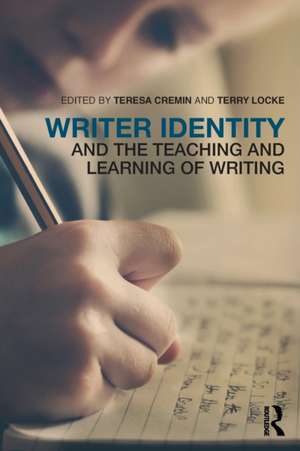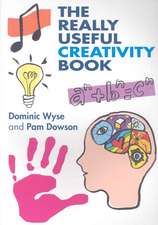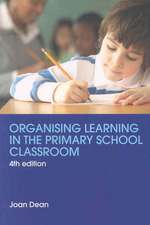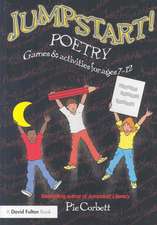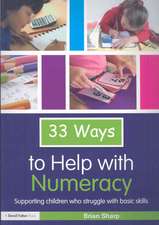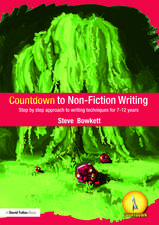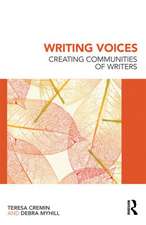Writer Identity and the Teaching and Learning of Writing
Editat de Teresa Cremin, Terry Lockeen Limba Engleză Paperback – 22 noi 2016
- Nuanced understandings of how writer identities are shaped and formed;
- Insights into how classroom practice changes when teachers position themselves as writers alongside their students;
- New understandings of what this positioning means for students’ identities as writers and writing pedagogy; and
- Illuminating case studies mapping young people's writing trajectories.
Contributors include: Teresa Cremin, Terry Locke, Sally Baker, Josephine Brady, Diane Collier, Nikolaj Elf, Ian Eyres, Theresa Lillis, Marilyn McKinney, Denise Morgan, Debra Myhill, Mary Ryan, Kristin Stang, Chris Street, Anne Whitney and Rebecca Woodard.
| Toate formatele și edițiile | Preț | Express |
|---|---|---|
| Paperback (1) | 387.16 lei 6-8 săpt. | |
| Taylor & Francis – 22 noi 2016 | 387.16 lei 6-8 săpt. | |
| Hardback (1) | 737.19 lei 6-8 săpt. | |
| Taylor & Francis – 22 noi 2016 | 737.19 lei 6-8 săpt. |
Preț: 387.16 lei
Nou
Puncte Express: 581
Preț estimativ în valută:
74.08€ • 77.54$ • 61.66£
74.08€ • 77.54$ • 61.66£
Carte tipărită la comandă
Livrare economică 01-15 aprilie
Preluare comenzi: 021 569.72.76
Specificații
ISBN-13: 9781138948907
ISBN-10: 113894890X
Pagini: 262
Ilustrații: 17 black & white illustrations, 9 black & white tables, 11 black & white halftones, 6 black & white line drawings
Dimensiuni: 156 x 234 x 25 mm
Greutate: 0.4 kg
Ediția:1
Editura: Taylor & Francis
Colecția Routledge
Locul publicării:Oxford, United Kingdom
ISBN-10: 113894890X
Pagini: 262
Ilustrații: 17 black & white illustrations, 9 black & white tables, 11 black & white halftones, 6 black & white line drawings
Dimensiuni: 156 x 234 x 25 mm
Greutate: 0.4 kg
Ediția:1
Editura: Taylor & Francis
Colecția Routledge
Locul publicării:Oxford, United Kingdom
Public țintă
PostgraduateCuprins
Preface Foreword Section A: Writing, writers and identity 1. Conceptualizing Writing and Identity 2. Professional writers’ identities: The perceived influence of formal education and early reading Section B: Writing identity and the development of teachers 3. ‘I’m not a good writer’: Supporting teachers’ writing identities in a university course 4. Addressing resistance: encouraging in-service teachers to think of themselves as writers 5. Developing the teacher-writer in professional development Section C: Teachers as writers: Shifting practices and positions in the classroom 6. Being a writer and teaching writing on the ‘rackety bridge’: Through the lens of new teachers 7. Teachers’ identities as writers: Teacher, support staff and pupils’ accounts of the role of emotion in the writing classroom 8. Working toward ‘I’m a writer and a pretty good writer’: An elementary teacher legitimising students’ writerly identities while authenticating her own 9. Developing a whole-school culture of writing Section D: Students’ writing identities 10. Being in the world’: Students’ writing identities beyond school 11. Glancing sideways at young writers becoming 12. Taught by bitter experience: A timescales analysis of Amalie’s development of writer identity 13. Writing reflexively: Students and teachers shaping texts and identities Afterword Index
Notă biografică
Teresa Cremin is Professor of Education (Literacy) at The Open University, UK.
Terry Locke is Professor of Arts and Language Education at the University of Waikato, New Zealand.
Terry Locke is Professor of Arts and Language Education at the University of Waikato, New Zealand.
Descriere
How does classroom practice change when teachers reflect upon the process of being a writer? What does it mean to identify as a writer? Bringing together international research voices, Writer Identity and the Teaching and Learning of Writing explores what it means to identify as a writer, the issues which surround the concept of being a writer, and the consequences which arise when teachers and students do or do not identify as writers. Focusing on primary and secondary students and their teachers, it also pays attention to pre-service teachers and the perspectives of professional writers, generating understandings that are new to teachers and open up promising new directions for research.
